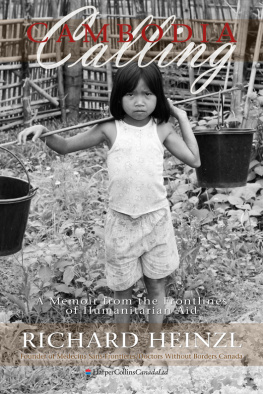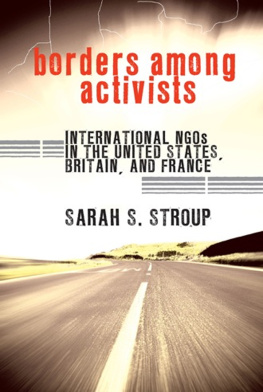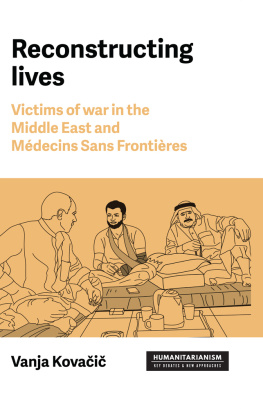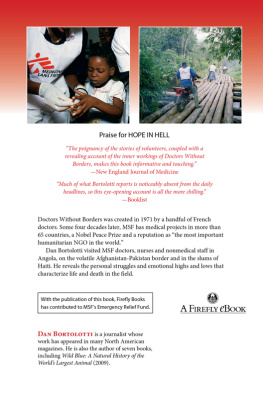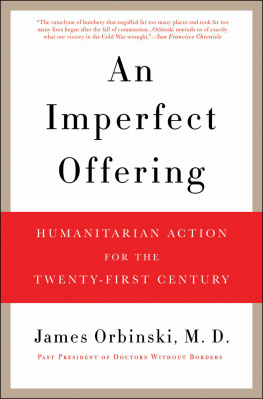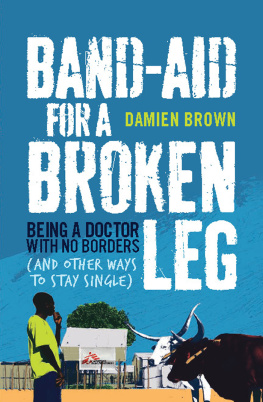DOCTORS WITHOUT BORDERS

DOCTORS WITHOUT BORDERS
Humanitarian Quests, Impossible Dreams of Mdecins Sans Frontires
RENE C. FOX

2014 Johns Hopkins University Press
All rights reserved. Published 2014
Printed in the United States of America on acid-free paper
9 8 7 6 5 4 3 2 1
Johns Hopkins University Press
2715 North Charles Street
Baltimore, Maryland 21218-4363
www.press.jhu.edu
Library of Congress Cataloging-in-Publication Data
Fox, Rene C. (Rene Claire), 1928 author.
Doctors Without Borders : humanitarian quests, impossible dreams of Mdecins Sans Frontires / Rene C. Fox.
p. ; cm.
Includes bibliographical references and index.
ISBN 978-1-4214-1354-9 (hbk. : alk. paper) ISBN 1-4214-1354-X (hbk. : alk. paper)
ISBN 978-1-4214-1355-6 (electronic)ISBN 1-4214-1355-8 (electronic)
I. Title.
[DNLM: 1. Mdecins Sans Frontires (Association) 2. Voluntary Health Agencies. 3. Epidemicsprevention & control. 4. Medical Missions, Official. 5. Relief Work. WA 1]
RA651
614.4dc23 2013032122
A catalog record for this book is available from the British Library.
Frontispiece. Cartoon of Don Quixote and his squire Sancho Panza that appeared on the front of T-shirts worn by members of Doctors Without Borders / Mdecins Sans Frontires at their 2005 La Mancha conference. Printed on the back of the shirts was the full text of the lyrics of The Impossible Dream, the theme song of the Broadway musical Man of La Mancha. Cartoon reprinted with permission from Samuel Hanryon, a.k.a. Brax, Rash Brax. Permission for use of lyrics from The Impossible Dream has been granted by Alan S. Honig.
Special discounts are available for bulk purchases of this book. For more information, please contact Special Sales at 410-516-6936 or specialsales@press.jhu.edu.
Johns Hopkins University Press uses environmentally friendly book materials, including recycled text paper that is composed of at least 30 percent post-consumer waste, whenever possible.
This book is dedicated to the women and men
I have taught over the years, to their dreams,
and to the fulfillment of their dreams
CONTENTS
with Olga Shevchenko
with Olga Shevchenko
DOCTORS WITHOUT BORDERS
The Quests
An Introduction
This introduction, and the book to which it is a prelude, encompass two interrelated quests. One is the continuous quest of Doctors Without Borders to provide international medical humanitarian assistance in ways that perpetuate and constantly revitalize its founding principles and ethos. The other is my own quest, through prolonged sociological research, to understand, chronicle, and reflectively analyze its mission, work, and distinctive culture.
Doctors Without Borders / Mdecins Sans Frontires (MSF) is an international medical humanitarian organization created by a small group of French doctors and journalists in 1971. Its mission is worldwide. As many as 27,000 MSF personnel, representing dozens of nationalities, provide medical assistance to people in more than sixty countries faced with violence, neglect, or catastrophe, primarily due to armed conflict, epidemics, malnutrition, exclusion from health care, or natural disaster. The vast majority of these doctors, nurses, logistics experts, laboratory technicians, epidemiologists, mental health professionals, and administrators are members of the communities in crisis; only ten percent of them are drawn from the international staff. In addition to delivering medical care, MSF reserves the right to speak out to
MSF views itself not just as an international organization but as an international movement. It is made up of several regional associations and of nineteen associative sectionsin Australia, Austria, Belgium, Canada, Denmark, France, Germany, Greece, Holland, Hong Kong, Italy, Japan, Luxembourg, Norway, Spain, Sweden, Switzerland, the United Kingdom, and the United States.
In this book, I present a sociological portrait of MSFof its principles, value commitments, culture, and field missions, and of the medical and moral challenges constantly raised by its humanitarian action. The inquiry from which the book incrementally developed began in 1993.
My experience in the Democratic Republic of Congo played a significant role in my decision to undertake a sociological study of MSF. Africa, and the Congo in particular, which were professionally and personally important to me, were major loci of MSFs work. For a while I entertained the idea of returning to the Congo to conduct firsthand research where MSF had been present since 1981a quixotic notion in light of the strife and terror, political instability, and social and medical plagues wracking that country.
The values that MSF espoused, and that its members pursued and concretized through their medical humanitarian action, drew me to them, and
I was strongly drawn to MSF as well by the simultaneously realistic and idealistic way in which its members saw the world as it isa world in which there are suffering and injustice, sickness and premature death and natural disasterswhile energetically refusing to let go of its vision of the world as it ought to be.
The meaning that MSF had for me as a teacher also enhanced my motivation for undertaking research on it. For many of the young nurses and doctors and premedical students I was teaching, MSF exemplified global humanitarian medicine, in which they had a keen interest, and in the case of some, a desire to participate, at least for a while, in the course of their unfolding professional careers.
Clearly, it was impossible for a solo researcher to conduct a firsthand study of all of MSFs sectionsits hundreds of projects, located at any one time in as many as seventy countries, and the thousands of people who worked with and for it in numerous different capacities. The decisions that I had to make about crafting and focusing the research so that it would be both feasible and sociologically meaningful were based on pragmatic, opportunistic, empirical, and analytical grounds. In the end, I spent the most concentrated periods with MSF France and MSF Belgium, two of the most important operational sections of the organization. They formed the primary launching pads for the trips that I made to observe MSF in action in the field. During the years of my research I also spent time in the national offices of MSF Australia, Canada, Greece, Holland, Sweden, South Africa, the United Kingdom, and the United States. In addition, the international meetings of MSF that I was invited to attend allowed me to observe the interactions between its multiple sections as they grappled with a range of common questions and problems in a characteristically MSF way.
My research benefited greatly from content analyses of the primary and secondary documents to which I was freely given access. These included communications between MSF staff members within the offices of its various headquarters, from headquarters to the field and from the field to headquarters, and transcripts of internal group discussions and meetings. This messaging was often accompanied by explanatory comments and expressions of opinion from the members of MSF who provided me with the documents. In addition, MSFs many websites were of inestimable value to my research, as demonstrates.
Next page


